10 Jun2019
By Jeffrey Johnston
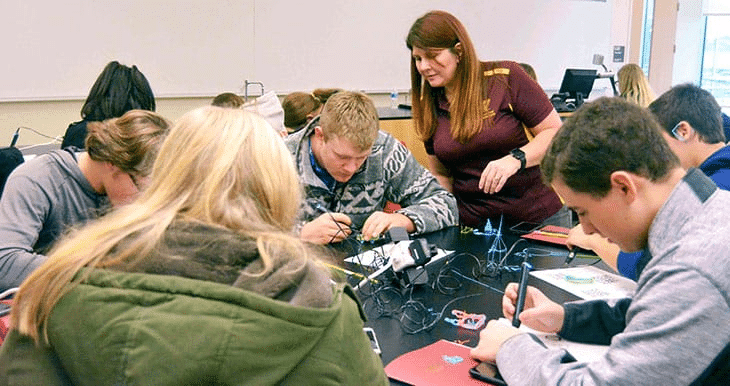
This article and photo originally appeared on the Central Michigan University website and are reprinted with permission.
What can you add to 688 to total 958?
In Central Michigan University’s teacher education programs, the answer is one year: From fall 2017 to fall 2018, admittance and enrollment in teacher ed grew from 688 students to 958, a 39% increase.
To Betty Kirby, acting dean of CMU’s College of Education and Human Services, the explanation is simple.
“CMU is the place to come for excellent teacher preparation,” she said, “and now is a great time to become a teacher.”
03 Jun2019
By Jerrica Thurman
Are you following what’s happening at AACTE’s Washington Week on Facebook and Twitter at #AACTEWW19? Tune into the daily Facebook Live Shows on the AACTE Facebook page and hear in real time what attendees have to say about the key signature events, session topics, networking, and pressing issues in educator preparation. You can watch these videos of the Facebook Live Shows from the past two days of the event:
Sunday, June 2
Monday, June 3
02 Jun2019
By Jerrica Thurman
(June 3, 2019, Washington, D.C.) – The American Association of Colleges for Teacher Education (AACTE) is convening its annual Washington Week, themed “Your Voice Matters,” June 2-5 at the Renaissance Arlington Capital View Hotel in Arlington, Virginia. Teacher educators, college students, and representatives from K-12 schools and national education organizations have united at the conference to amplify their voices on federal and state policies affecting educator preparation. During the sessions, attendees hear the latest updates on national education trends and receive advocacy training in preparation for their congressional meetings on Capitol Hill June 5 to advocate for educator preparation.
“AACTE state chapter leaders, Holmes Scholars students, and colleges of education administrators from across the nation have gathered at AACTE’s event this week to advocate for the future of education,” said Lynn M. Gangone, AACTE president and CEO. “We are here to raise our collective voices and petition our Members of Congress for their support to help solve teacher shortages, increase teacher diversity, and maintain teacher and students’ safety in the classroom among other pressing issues in educator preparation.”
30 May2019
By New Mexico Highlands University
This article originally appeared on the New Mexico Highlands University website and is reprinted with permission.
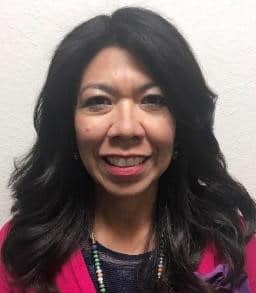 Elisabeth Valenzuela is the first coordinator for the Regional School Partnership, a collaboration among Pojoaque Valley Public Schools, Los Alamos National Laboratory and New Mexico Highlands University that aims to support improved teaching and learning.
Elisabeth Valenzuela is the first coordinator for the Regional School Partnership, a collaboration among Pojoaque Valley Public Schools, Los Alamos National Laboratory and New Mexico Highlands University that aims to support improved teaching and learning.
The innovative partnership, launched in October 2018, is the first of its kind in New Mexico to combine a school district, a major employer and a university teacher education program. It focuses on increasing success for youth in grades 4 through 8.
“The clinical residency program is the most exciting element of this new partnership,” Valenzuela said. “Pre-service teachers who are students in the Highlands School of Education will spend their junior and senior years working three days a week co-teaching a classroom in Pojoaque schools. These college students will work under the mentorship of a highly qualified teacher.”
Valenzuela said Los Alamos National Laboratory has a history of working with Northern New Mexico school districts to improve teaching and learning.
30 May2019
By Ward Cummings

The Education Commission of the States (ECS) recently released a report regarding college campus safety policies, based on its research gathered from statutes in all 50 states, the District of Columbia and Puerto Rico. Though it does not include postsecondary board or institutional policies, the 50-State Comparison: Postsecondary Campus Safety report provides an overview of relevant laws in each state. However, this resource does not reflect on how these laws may interact with other state or federal policies.
Key takeaways from the report include the news that 22 states have codified a campus sexual assault policy; five states have defined affirmative consent; and 22 states have written into statute a prohibition for individuals to carry firearms on public college or university campuses.
This resource reviews state statutes that explicitly address sexual misconduct on college campuses or off-campus incidents that involve at least one student. It also examines state statutes that explicitly allow or prohibit guns on college campuses and those states in which statute allows guns in locked vehicles on college campuses. Follow this link to download and review this important report.
For questions about this announcement or other offerings by ECS, please email me at wcummings@aacte.org.
30 May2019
By Timothy Drake

“Wait, what happened?!?”
“I had to help deliver a baby today.”
“You what!?!”
In the first day of her full-time residency, Jennifer Wilker had to help one of her teachers deliver her baby. Jennifer was in Warren New Tech High School, which is located near Norlina—a small, rural town in northeastern North Carolina that is over 30 miles from the Halifax Regional Hospital.
Though this seems like an extreme example, principals all over the country will no doubt smile, knowing that Jennifer’s experience isn’t too atypical.
30 May2019
By Brandon R.T. Frost
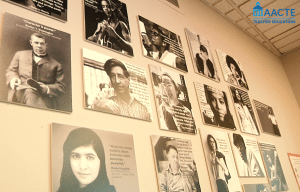
Portland State University’s Graduate School of Education offers a unique, two-year, full-time master’s degree in secondary dual education. In 2014, the Department of Curriculum and Instruction and the Department of Special Education joined together to meet the need of the surrounding communities to increase the number of teachers who are skilled in effective practices for a variety of students. Graduates of the program are equipped to implement inclusive and equitable practices.
“The secondary dual education program in the Graduate School of Education really represents, I think, innovation, collaboration, and equity and inclusion at its highest levels,” says Marvin Lynn, dean of the Graduate School of Education at Portland State University. This particular program was born out of need to ensure all teachers are meeting the needs of all students in the classroom. The emphasis on diversity and equity is part of the Graduate School of Education’s strategic mission as an access university.
30 May2019
By Jennifer Babich
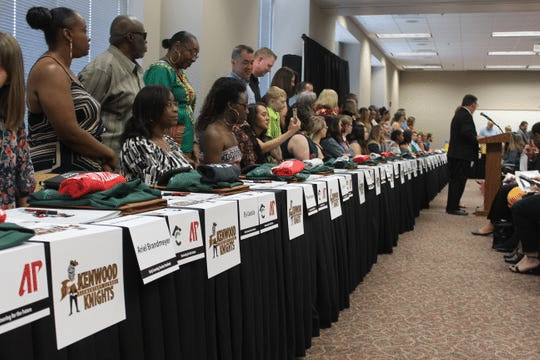
The first class of residents in the Early Learning Teacher Residence program, a partnership between Austin Peay State University and the Clarksville-Montgomery County School System, wait to sign their contracts on May 24, 2019. (Photo: Jennifer Babich)
This article and photo originally appeared in the Leaf Chronicle and are reprinted with permission.
These are not your typical college students.
Instead, they’re the first class of aspiring professionals embarking on a free three-year residency and degree program to turn themselves into teachers, as part of a partnership between Clarksville-Montgomery County Schools and Austin Peay State University.
30 May2019
By Scott Gibbons
The views expressed in this post do not necessarily reflect the views of AACTE.
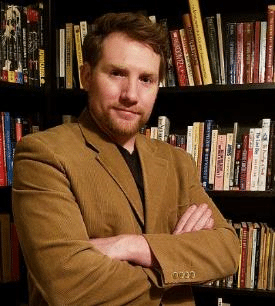 Can there be something within a teacher’s professional identity that enables them to better engage their students? If so, what are some ways an educator can shape their professional identity to more effectively engage their students in content and skill development?
Can there be something within a teacher’s professional identity that enables them to better engage their students? If so, what are some ways an educator can shape their professional identity to more effectively engage their students in content and skill development?
Education researchers (Salli & Osam, 2018) suggest that a teacher’s professional identity is a balance between both teaching strategies and the teacher’s interactions with students. A person’s identity is made up of several unique perspectives (I-positions), working both separately and in harmony with one another to effect one’s decisions and actions in a given situation (Meijers & Hermans, 2018). I-positions are made up of a person’s past experiences, and each I-position then assumes a role within the person’s identity. When a person encounters a new situation, several I-positions may be activated at the same time and through dialogic interaction, either collaborate or form tension with each other in order for the person to make a decision and act within that situation.
The collaboration and tension among I-positions is where a person’s identity is formed or grows.
24 May2019
By Jerrica Thurman
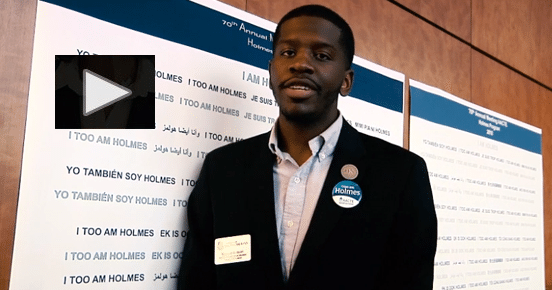
In this latest video entitled, “I am Holmes Too,” Holmes coordinators and students discuss the value of the AACTE Holmes Program, which focuses on recruiting educators of color into the teaching profession. They share how the program supports their work, research, and advocacy efforts in educator preparation.
Here’s what a few of the participants had to say:
“I would like to say thank you to Holmes for being a great support system throughout my academic journey.” – Jerraco Johnson, Auburn University
“One thing I appreciate about being part of Holmes is it provides the opportunity to learn and grow from others as well as provide me with research opportunities.” – Talisa Jackson, George Mason University
24 May2019
By Brandon R.T. Frost
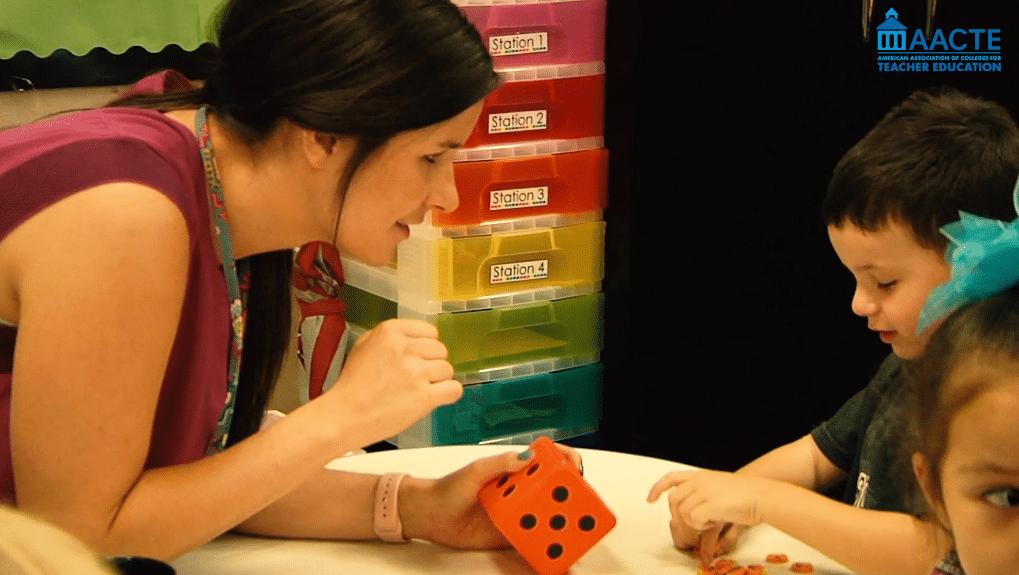
Bowling Green State University’s innovated Inclusive Early Childhood Education program seeks to address the need for teacher candidates to be well prepared to enter the classroom. BGSU recognized the importance of shifting their program to assist their teacher candidates in garnering the necessary teaching practices for a changing classroom environment. “We certainly have a wide array of learners with very diverse needs and one the things that this program helps us do is to ensure that we are graduating teachers that are ready to meet the needs of all those learners,” says Dawn Shinew, dean of the College of Education and Human Development at Bowling Green State University.
Every year, BGSU places over 900 teachers through 88 different partnerships with school districts throughout Ohio, which include both urban and rural districts and social service agencies. Teachers are expected to continue taking coursework during their clinical placements to ensure there is a connection among their coursework and their teacher training in the field. More importantly, BGSU believes teacher candidates should be exposed to the fieldwork earlier than what more traditional programs prescribe. Whereas other, more traditional programs place teacher candidates as student-teachers in their senior year of undergraduate studies, BGSU starts placing juniors in clinical settings with the hope to increase their exposure to their career and receive additional training in a variety of education settings, including special education and inclusive classrooms.
24 May2019
By University of Arkansas
This article originally appeared on the University of Arkansas website and is reprinted with permission.
Three University of Arkansas teacher candidates recently surprised their public school mentor teachers with banners lauding them as a Mentor Teacher of the Year for 2018-19.
U of A students in the teacher-education program spend either a full semester or year as interns in public schools across Northwest Arkansas for hands-on training before they have their own classrooms to manage.
“The internship is the most crucial aspect of our teacher preparation programs and mentor teachers are the lifeblood of the experience,” said Jake Ayo, director of field placement for the Office of Teacher Education in the College of Education and Health Professions. “They go above and beyond in an already demanding profession as they pour their time and energy into crafting our interns into teacher leaders.”
Being paired with a great mentor educator in local schools is vital to a student teacher’s success. Every year, public school teachers are named Mentor Teacher of the Year and are chosen based on their U of A intern’s nomination. The university recognizes the teachers who demonstrate a positive impact on teacher candidates’ development and P-12 student learning and development.
23 May2019
By Georgia Southern University
This article originally appeared on the Georgia Southern University website and is reprinted with permission.
 Georgia Southern University and Haven Elementary School are partnering to offer teachers a Gratifying Problem-Solving (GPS) program, which will provide educators unique monthly professional development based on the school’s current need for improved mathematics instruction.
Georgia Southern University and Haven Elementary School are partnering to offer teachers a Gratifying Problem-Solving (GPS) program, which will provide educators unique monthly professional development based on the school’s current need for improved mathematics instruction.
The College of Education’s Jackie Kim, associate professor of elementary and special education, serves as director for the project, totaling $74,976, which is funded by a Community Partnership Grant from the Governor’s Office of Student Achievement.
The GPS program uses a bottom-up approach, allowing the participants at Haven Elementary to help shape its development, workshop activities and directive.
“We go to find out what their inquiries and needs are and create a workshop based on the assessment,” said Kim. “We want to start with what they are currently doing in the classroom and change their practice to make instruction stronger yet doable.”
23 May2019
By Ward Cummings

The Department of Education is seeking Hispanic-Serving Institutions (HSIs) applicants to apply for a portion of a new $24 million developmental grant created to address low completion rates among Hispanic postsecondary students.
This new grant is open to all HSIs that demonstrate a commitment to developing ways to identify and address the strengths and weaknesses of their institution’s enrollment, retention, and support for Hispanic and low-income students. The Department of Education will support projects designed to expand the number of Hispanic students at the undergraduate, graduate, and professional level and that help to facilitate their rates of graduation. HSI programs hoping to use the grant to expand and enhance the academic offerings, program quality, faculty quality, and institutional stability of colleges and universities that serve a majority of Hispanic students are encouraged to apply.
Awards will not exceed $600,000 for a single budget period of 12 months. The deadline for applying for these FY19 awards is July 15, 2019.
Those institutions interested in applying are encourages to visit grants.gov.
Do you have questions about this announcement? Please contact me at wcummings@aacte.org.
23 May2019
By Matthew Wales

Academic leaders from across the country are preparing to gather in Pittsburgh, PA, for AACTE’s annual Leadership Academy. In one month, attendees will experience an interactive and engaging professional development opportunity designed to advance their leadership skills while exploring a wide range of topics. And even if you have attended in the past, you should consider returning this year, June 23-27, as the program has once again integrated new content into the curriculum (view the full schedule).
Academy faculty first redesigned the content of the popular “Managing Conflict” sessions in 2017 by incorporating avatars into the program. Faced with difficult conversations and topics likely to occur in an academic environment, groups of job-alike attendees collaborate to design effective responses to the scenarios proposed. Their conflict-response plans are tested in simulated encounters, as volunteers meet with avatars, who emulate the situations attendees are likely to face when they return to their institutions.
“This training was one of the most valuable I’ve participated in,” said an attendee from the 2018 Leadership Academy about their avatar experience. “It provided an opportunity to define my objectives, take notes, and reflect upon how I could communicate more clearly.”



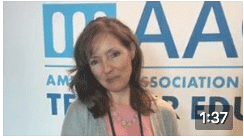
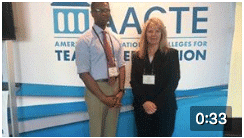
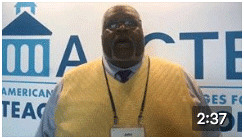
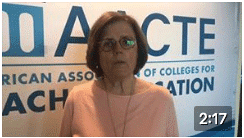
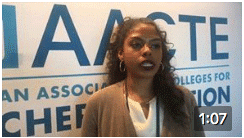
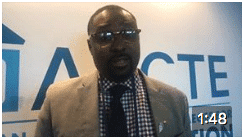
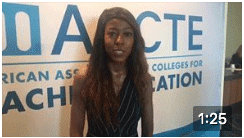
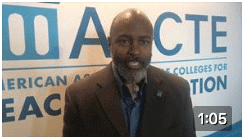
 Elisabeth Valenzuela is the first coordinator for the Regional School Partnership, a collaboration among Pojoaque Valley Public Schools, Los Alamos National Laboratory and New Mexico Highlands University that aims to support improved teaching and learning.
Elisabeth Valenzuela is the first coordinator for the Regional School Partnership, a collaboration among Pojoaque Valley Public Schools, Los Alamos National Laboratory and New Mexico Highlands University that aims to support improved teaching and learning.



 Can there be something within a teacher’s professional identity that enables them to better engage their students? If so, what are some ways an educator can shape their professional identity to more effectively engage their students in content and skill development?
Can there be something within a teacher’s professional identity that enables them to better engage their students? If so, what are some ways an educator can shape their professional identity to more effectively engage their students in content and skill development?

 Georgia Southern University and Haven Elementary School are partnering to offer teachers a Gratifying Problem-Solving (GPS) program, which will provide educators unique monthly professional development based on the school’s current need for improved mathematics instruction.
Georgia Southern University and Haven Elementary School are partnering to offer teachers a Gratifying Problem-Solving (GPS) program, which will provide educators unique monthly professional development based on the school’s current need for improved mathematics instruction.
